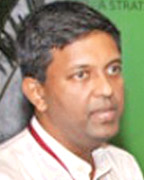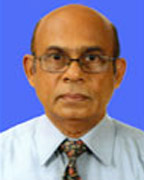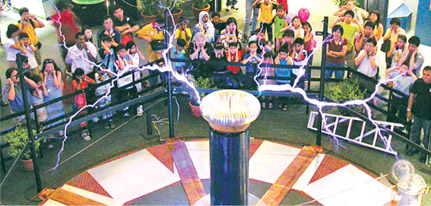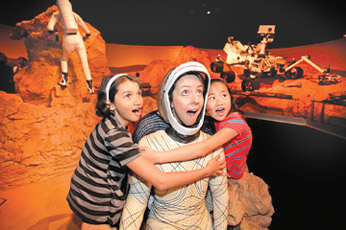National Science Centre vital to make Sri Lanka a knowledge hub
by Dhaneshi Yatawara
 |
| Prof. Ajith de
Alwis |
 |
| Dr Nobel
Jayasuriya |
Every individual needs to use scientific knowledge to make choices
for themselves that arise everyday, from health and nutritional issues
to resilience to disasters. Unfortunately for Sri Lanka the public
perception of science and technology is one of sheer indifference. The
majority of Sri Lankans, including policy makers and the younger
generation have not yet changed their mindset about the direct
involvement of science and technology in national development. Given the
high literacy and relatively high per capita income compared to other
countries in the region, Sri Lanka lacks a science culture due to the
poor understanding of science and technology and innovations at all
levels of the society.
An attitudinal change would be the foundation from which knowledge
empowerment and rapid economic-takeoff towards a knowledge based economy
could occur. In a rapidly advancing world, every citizen needs to be
adequately equipped with the latest knowledge to engage intelligently in
public dialogue and debate about important issues of the society from
genetically modified food to energy options, safety of food, water and
environment and nuclear energy. It is the responsibility of the
authorities to ensure adequate scientific literacy amongst its people.
In this backdrop President Mahinda Rajapaksa in his budget speech
2013 marks Government allocations for a National Science Centre as a
gigantic step towards making the country a knowledge hub. Science
centres are becoming increasingly recognised and valued as a key
component of educational and recreational infrastructure in many
countries, specially to inculcate scientific culture in the communities.
This sort of institutes can be either as science centres, museums or
even as an Exploratorium. According to data gathered by Coordinating
Secretariat for Science, Technology and Innovation aka COSTI, even in
the South Asian region we are the only country living without such an
institute. India already has 27 Science Centres, Pakistan has two,
Bangladesh and Nepal has one each. Singapore has one such institute,
Malaysia has two, Thailand has one and Philippines has three - apart
from larger figures we see in the much developed countries.
|

National Science Centre |
Sri Lanka Association for the Advancement of Science and National
Science Foundation have been pushing the concept of having a science
centre established in the country. "National Science Centre is not a new
one. It is high time Sri Lanka established a Science Centre. It is to
encourage the young generation for experiential learning," said Prof.
Ajith de Alwis, Project Director of the Coordinating Secretariat for
Science, Technology and Innovation (COSTI), a newly established state
entity mandated with coordinating and monitoring scientific affairs.
It is a place to encourage visitors to make connections between ideas
in a different and unexpected way through exhibits that reflect
contemporary issues and the dialogue around interdisciplinary exchange.
It is a place to explore relationship with culture and science. It would
remind the visitors of the vast constellation of ideas represented in
the history of sciences. Luckily for art museums and science centres the
opportunities to highlight connections between the arts and sciences are
numerous.
The Coordinating Secretariat for Science, Technology and Innovation
(COSTI) was established on February 1, 2013 as mandated by the cabinet
decision of September 9, 2011 with the specific aim of coordination and
monitoring of Science, Technology and Innovation activities in the
country.
It will also work towards promoting value addition and
commercialisation in line with the National Science Technology and
Innovation (STI) Strategy of Sri Lanka approved by the Cabinet in August
2010.
GII 2013 report, ranks 142 economies. It uses a broad set of 84
indicators including the quality of top universities, research spending,
availability of micro-finance and venture capital. It calculates both
innovation capabilities and measurable results, and places them in a
broader socio-political context.
Malaysia tops among upper middle income countries (overall rank 32)
while China is 35. India comes in at No 66, the highest ranked in South
Asia. Sri Lanka, with a score of 30.45 out of a total possible 100, is
ranked at No 98, two thirds of the way down the list.
"We may have slid down - or others may have been more active! Our
'neighbours' in 2013 rankings are the same as in 2012 rankings," he
said.
|

Teacher Grace Lauretti-Martin with students Vedika Arekar and
Selina Liao from Toronto's Forest Manor Public School imagine
they
are exploring Mars in the new exhibition 'Beyond Planet Earth:
The Future of Space Exploration', on at the Ontario Science
Centre until
January 1, 2013 - CNW Group Ontario Science Centre |
"Sri Lanka hopes for not only a per capita income uplift but a
different economic status too.
An innovation driven economy implies internal innovativeness and an
excellent national competitiveness in a global marketplace.
Science and technology play a significant role in this transition.
Having mere expectations with any type of activity will not deliver this
situation. It is not easy to be an innovative economy," Prof. de Alwis
said.
"When Sri Lanka is forging towards becoming a knowledge hub, but
going there without a place like a Science Centre looks odd, said Prof.
de Alwis.
A key goal of the COSTI will be to coordinate and monitor the
planning, preparatory and implementation stages, linkages with Science
Centres and other relevant organisations abroad and subsequent
monitoring the functioning of the National Science Centres.
The COSTI will report to the Inter-Ministerial Committee on Science,
Technology and Innovation," said Dr. Nobel Jayasuriya, Program Director
of COSTI.
"We need the active participation of all stake holders - private and
public both - in order to make this a reality. A science Centre is not a
museum. It is an interactive place," said Dr. Jayasuriya.
Through COSTI collated previous ideas of establishing a science
centre the concept was incorporated in to the 2014 budget of the
Government.
"We are trying to coordinate among the stake holders and make the
process move on to finally have the Science Centre in Sri Lanka," said
Prof. Alwis.
Thus, the COSTI is planning getting all the local stakeholders
together and incorporate international assistance in guiding Sri Lanka
to set up a vibrant science centre making the dream of creating a
knowledge hub in Sri Lanka a reality.
|

